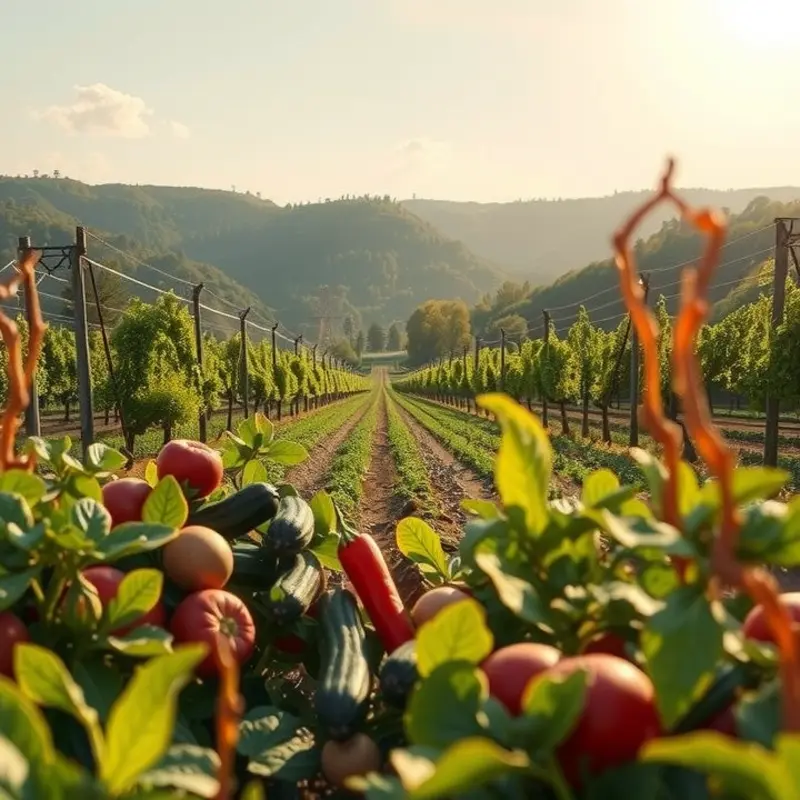Choosing eco-friendly cooking ingredients not only benefits the planet but also enhances your meals. From organic produce to plant-based staples, making mindful choices leads to delicious and sustainable dishes. By incorporating these ingredients, you contribute to a healthier environment while enjoying vibrant flavors and nourishment.
Organic Fruits and Vegetables: Nature’s Bounty

Embracing organic fruits and vegetables in your kitchen means welcoming the earth’s purest gifts into your culinary repertoire. Grown without synthetic pesticides or fertilizers, these ingredients offer both health benefits and a sustainable choice for the environment.
Organic farming prioritizes building soil fertility through natural practices. Crop rotation, composting, and natural pest control are essential components. These methods not only enhance biodiversity but also enrich the nutrient profile of the produce. As a result, organic fruits and vegetables often provide higher antioxidant levels and essential nutrients. Vitamin C and various phytochemicals flourish in such rich, undisturbed soils.
Understanding the nutritional advantages of organic produce involves recognizing the absence of harmful residues. Conventional farming often relies on chemicals to deter pests or boost growth. Organic methods, however, emphasize a harmonious balance with nature. This means that when choosing organic, you’re also opting to reduce your intake of potentially harmful substances.
Selecting the best organic produce requires a discerning eye. Look for a vibrant color as it indicates the product is at its peak freshness and nutrient potential. Firmness and aroma are other indicators of quality. If you’re unsure about a fruit or vegetable, feel for slight resistance when pressed; it shouldn’t give in easily. Smell the produce; aromatic scents suggest ripeness. Staying local wherever possible enhances these benefits further.
Supporting local farmers by purchasing their organic produce not only connects you to the food source but also strengthens community resilience. When you buy local, you contribute directly to the local economy, aiding small-scale farmers in competing in a globalized market. Plus, reduced travel distance results in a lower carbon footprint. Consider how much fresher your strawberries taste when they’ve traveled just a few miles compared to being shipped across countries. Understanding how to select and store fresh ingredients wisely can also minimize waste and ensure longevity in your kitchen.
Considering these aspects makes clear how consuming organic fruits and vegetables ties into eco-friendly practices. By opting for these, you support the environment, bolster local economies, and favor a healthier lifestyle. Remember, every small shift in purchasing habits can lead to significant positive impacts on the planet.
Plant-Based Essentials: Transforming Meals with Mindfulness

Plant-based ingredients such as legumes, nuts, and grains hold the key to transforming our meals into heartier, healthier affairs while honoring our planet. These ingredients aren’t mere substitutes but rather vibrant focal points in a culinary experience that celebrates sustainability and mindfulness.
Legumes like lentils, chickpeas, and beans are nutritional powerhouses. High in protein, fiber, and essential vitamins, they offer a robust base for diverse dishes. Beyond their health benefits, they leave a smaller carbon footprint compared to meat. By incorporating legumes into your meals, you not only support your health but also contribute to the reduction of greenhouse gas emissions. Try adding cooked lentils to your salads for a protein boost or blend chickpeas into a creamy hummus.
Nuts are more than just snacks; they are versatile culinary allies. Almonds, walnuts, and cashews can create creamy sauces, decadent desserts, and crunchy toppings. These ingredients are rich in healthy fats and essential nutrients, supporting heart health and providing sustained energy. Consider using almond meal in baking for a nutrient-dense alternative to flour, or cashew cream as a dairy-free sauce option.
Grains like quinoa, barley, and farro add texture and nutritional depth to meals. Quinoa, for instance, is a complete protein, making it an excellent meat alternative. Using these grains diversifies your plate and reduces reliance on resource-intensive animal products. Incorporate whole grains into soups, stews, or salads to boost fiber and satiety.
The transition to a more plant-based diet doesn’t require drastic changes. Start with one plant-based meal a week and gradually increase your frequency. Embrace mindful eating by being present and appreciating the flavors and textures of each ingredient. This practice not only enhances your enjoyment but also strengthens your connection to the food and its origins.
For those seeking inspiration, explore these minimal prep dinner ideas for integrating plant-based meals into your routine with ease. These simple, quick meals demonstrate that sustainable eating can fit into any lifestyle.
Incorporating plant-based essentials into your diet requires a shift in focus but promises remarkable benefits for your health and the environment. With legumes, nuts, and grains as your allies, you can create delicious, eco-friendly meals that honor both your body and the planet.
Final words
Embracing eco-friendly cooking ingredients is a rewarding experience for both your palate and the planet. By selecting organic produce and plant-based staples, you contribute to sustainable agriculture and a healthier lifestyle. Supporting local farms and making mindful choices are essential steps towards reducing your carbon footprint. Each meal becomes an opportunity to celebrate nature’s bounty and promote environmental stewardship. Let your kitchen be a place where sustainability meets deliciousness, inspiring others to follow suit in nurturing both their health and the earth.








